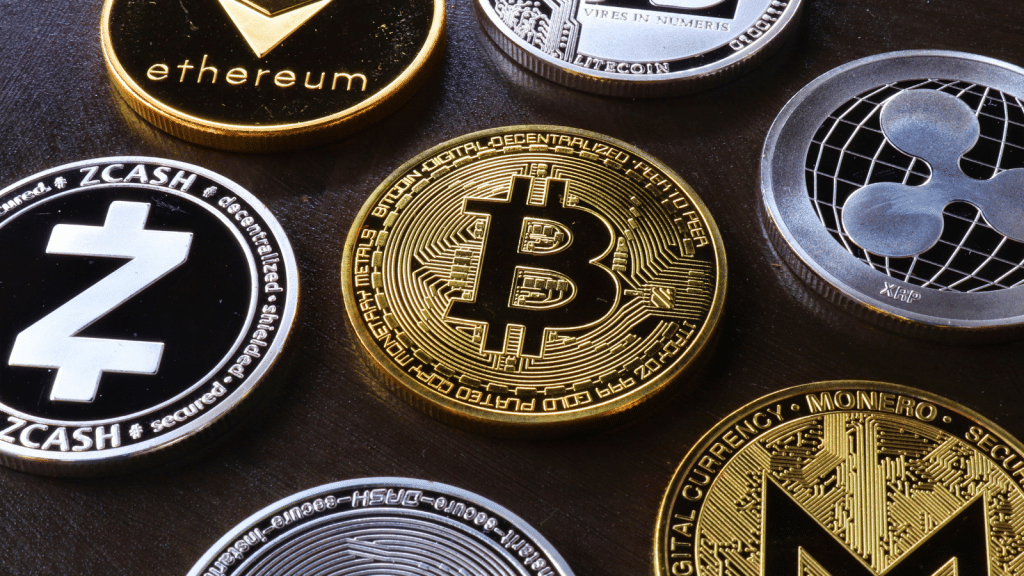Cryptocurrency will not save Putin from sanctions
By Aaron Arnold, Allison Owen | March 1, 2022
 Image of Bitcoin and other cryptocurrencies, courtesy of Getty Images/Canva
Image of Bitcoin and other cryptocurrencies, courtesy of Getty Images/Canva
Russia is now facing the most restrictive sanctions regime in its history, but despite speculation to the contrary, Moscow is unlikely to find shelter in cryptocurrencies.
But first, a quick re-cap of the events that brought us here.
The president of Russia, Vladimir Putin, launched an invasion of neighboring Ukraine very early Thursday night, February 24. The West responded with a series of ever-stricter financial sanctions, culminating last Saturday, February 26, when Washington, London, and Brussels imposed a partial ban from the international banking system known as SWIFT and, more important, targeted the ability of Russia’s central bank to access to its foreign currency reserves, putting nearly $630 billion at risk. Though it got much less emphasis from the world’s press than SWIFT did, targeting Russia’s central bank was probably the more significant act and the better path to go: “In one fell swoop, that announcement has essentially eradicated the relevance of Russia’s massive official foreign exchange reserves, and with it, sowed the seeds for big problems for the Russian economy,” wrote a former UK Treasury minister in an op-ed for the Guardian.
These actions were in addition to the round of sanctions announced earlier in the week that targeted the elites within President Vladimir Putin’s inner circle, as well as those that stand to gain from Russia’s aggression against Ukraine.
The result was harsh and immediate: Russian markets are down, and the ruble is collapsing.
Speculation is rife about how Moscow may try to dampen the effects of sanctions by leveraging cryptocurrencies. Some of these scenarios reach near-absurdity; one New York Times article suggested that those subject to targeted sanctions, such as Putin’s oligarchs, could resort to ransomware attacks—effectively holding data hostage for payment in cryptocurrency.
Another article, this time in the Wall Street Journal, suggested that Russia could take a page from Iran’s playbook and mine cryptocurrencies as a way to skirt sanctions.
Let us look at the errors contained within each of these ideas in turn.
Why try to leverage crypto? Cryptocurrencies, such as Bitcoin, are a form of digital asset meant to hold value and be exchanged without the need for a central authority, like a bank. (There are nearly 10,000 different cryptocurrencies, but Bitcoin is the most well-known.) Much of the speculation about how cryptocurrencies could help Russia evade Western sanctions, however, is based on a flawed assumption: that cryptocurrency is the same as currency backed by a central bank, or so-called “fiat currency”—more familiar as dollars, euros, or pounds sterling, to name just a few examples.
Regardless of the flavor of cryptocurrencies, one thing they all seem to have in common is the anarchic promise that one day they will replace government-backed fiat currency—but that day is not today. While the estimated market capitalization of Bitcoin is about $715 billion, most of the buying and selling of it is done by speculative investors. More businesses are accepting Bitcoin and other forms of cryptocurrency as a form of payment, but according to a report by Chainalysis, a cryptocurrency analytics firm, only one percent of business transactions are for goods and services.
Most countries do not consider cryptocurrency a form of currency, either. The US Treasury Department, for example, categorizes cryptocurrencies and other types of digital assets, such as non-fungible tokens, as a type of security—like a stock or a mutual fund.
Converting any cryptocurrency into a fiat currency like dollars is easier said than done. This can be seen in a recent New York City criminal case. Earlier this month, the US Justice Department charged a Manhattan couple, Ilya Lichtenstein and Heather Morgan, with conspiracy to launder a whopping $4 billion in Bitcoin, which a hacker (or hackers) had stolen in a 2016 attack against Bitfinex—a cryptocurrency exchange. The IRS-led investigation resulted in the federal government seizing $3.6 billion worth of digital assets, marking the largest confiscation in US history and only the most recent in a spate of seizures over the past two years.
It seems that after the Bitfinex hack, the hackers attempted to launder the loot by moving the stolen crypto through so-called “darknet markets,” privacy wallets, and exchanges. Despite the thieves’ efforts to obfuscate the source of their funds, law enforcement was able to trace the illicit proceeds from the now-defunct darknet marketplace Alphabay to a cryptocurrency exchange account held by Lichtenstein. (The Federal government is not claiming that Lichtenstein and Morgan did the actual hacking of the exchange; instead, the duo is only charged with laundering the proceeds.)
The authorities say that in an attempt to hide their tracks, Lichtenstein and Morgan used a method called “chain hopping,” which involves multiple transfers between different forms of cryptocurrency. But all was for naught—the couple was ultimately undone because they bought a WalMart gift card (more formally known as a stored value card).
Why a gift card? Because, says the consumer protection page of the Federal Trade Commission, gift cards are easy for people to find and buy, and the cards have fewer protections for buyers compared to some other payment options. Telemarketing scammers can get quick cash, without ever having to show their faces, and the transaction is largely irreversible.
But there is a problem for scammers, however: Generally, the maximum amount allowable on a single gift card is $500. Suppose the ambitious New York couple referenced above was able to procure 200 gift cards per day—it would take them nearly 110 years to launder the entire $4 billion. Also, buying gift cards with cryptocurrency can still leave behind digital footprints, like an IP address, which authorities can generally track to a specific physical address.
This example illustrates two important points. The first is that dealing in cryptocurrencies is not as anonymous as most people seem to believe. Not only is law enforcement getting better at cryptocurrency asset-tracing (following the money), but entire industries are emerging that are centered around identifying and mitigating criminality on the shared database known as a blockchain. The second is that at some point, a would-be launderer needs to interact with a banking institution—and it is here that the banks have the upper hand. Sudden unexplained wealth, for example, would raise red flags.
Indeed, North Korea has a similar problem. Since 2017, the country has launched cyberattacks aimed at cryptocurrency exchanges; several of these forays have been featured in the UN Panel of Experts reports on North Korea’s sanctions evasion activities. Cryptocurrency is a lucrative target because it is low-hanging fruit for the cash-strapped and isolated regime. North Korea has been rather successful in stealing cryptocurrency, with some experts estimating that its supply of stolen cryptocurrency exceeds $2 billion, given today’s prices. The regime has been less successful, however, in its efforts to convert its cryptocurrency into traditional fiat currency—a form of payment which is far more useful to the regime for funding its illicit oil imports and its trade in dual-use goods and technology.
Not that the regime has stopped trying. Case in point: In March 2020, the US Justice Department charged two Chinese nationals for their role in assisting North Korea to launder its ill-gotten cryptocurrency. The indictment alleges that the two received stolen cryptocurrency from a North Korean-linked virtual wallet, which they then proceeded to launder into fiat currency at several Chinese banks. To try to hide their activity, they used several methods, including the use of what are known as “peel-chains”—a method that turns one cryptocurrency transaction into thousands of smaller transactions. All told, the launderers received just over $91 million worth of stolen cryptocurrency and successfully deposited nearly a third into their bank accounts.
The part of this story that tends to be missed is that it is not clear how much the two Chinese brokers paid for the stolen cryptocurrency. Perhaps an apt analogy would be an art heist. Stealing a painting is only half of the act; the other half is finding a willing buyer—someone willing to take on the risk of holding onto a “hot” painting. Like the New York couple faced with trying to convert nearly $4 billion in Bitcoin to hard cash, the two Chinese brokers found out the hard way that it is far easier said than done.
Nevertheless, governments are taking cryptocurrency threats more seriously. Last October, US Deputy Attorney General Lisa Monaco announced the creation of a new unit tasked with setting strategic priorities for investigating and prosecuting “criminal misuses of cryptocurrency, particularly crimes committed by virtual currency exchanges, mixing and tumbling services, and money laundering infrastructure actors.”
Probably the key areas involve how to monitor and regulate decentralized exchanges. Unlike other types of cryptocurrency exchanges, decentralized exchanges allow users to exchange one type of cryptocurrency for another, on a peer-to-peer basis—meaning that there is no intermediary. According to a report by the research firm Chainalysis, North Korea’s cryptocurrency laundering methods make extensive use of decentralized exchanges and mixers, before finally sending the resulting Bitcoins to exchanges based in Asia that provide crypto-to-fiat services.
In both cases, the problem of converting cryptocurrency to dollars (or any other common fiat currency) remains the same. At some point, banks will need to be involved—and this is the Achilles’ heel for large laundering transactions.
The Financial Action Task Force—the international body responsible for setting anti-money laundering standards—updated its guidance in June 2019 to cover virtual assets (i.e., cryptocurrencies and other forms of digital assets). A problem, however, is that countries have been slow to adopt appropriate rules and regulations, thereby leaving gaps that criminals—or sanctions evaders—may seek to exploit. A review showed that only 50 percent of member countries were deemed “largely compliant” or “compliant” with its recommendations to “manage and mitigate the risks emerging from virtual assets.”
The US Financial Crimes Enforcement Network—the supervisory body responsible for monitoring the implementation of anti-money laundering rules and regulations—issued guidelines in May 2019 that made it clear that virtual asset exchanges are subject to the same registration and regulatory requirements as money service businesses. This means that the exchange houses that service customers’ transactions are required to submit reports of suspicious transactions and conduct due diligence on customers opening new accounts.
So laundering is problematic. Can Russia instead “mine” its way around sanctions? Mining cryptocurrency refers to the process by which “miners” (actually, folks overseeing banks of computers) are rewarded with fractions of a Bitcoin, or other cryptocurrency, in return for keeping the asset’s ledger in good order. Maintaining an accurate ledger—essentially a running list of transactions stored on a shared database known as a blockchain—requires the miners to compete to solve a cryptographic problem. The winner gets to record the block of transactions and is rewarded. Unlike the early days of mining, today’s mining operations are conducted on a massive scale, sometimes spread over wide geographic areas. Until China cracked down on cryptocurrency mining in September 2021, that country accounted for nearly 74 percent of the world’s Bitcoin production. The title now belongs to the United States, accounting for just over a third of the world’s mining activity.
Mining cryptocurrency is a fundraising technique that sanctioned countries have pursued to generate excess revenue to its economy. Iran, which accounted for an estimated 4.5 percent of all mining in 2021, could bring in an annual revenue of almost $1 billion.
The feasibility of such an effort and the likelihood that Russia could engage in enough mining activity to make any practical difference is low. According to the University of Cambridge’s Bitcoin mining map, Russia-based mining, as of July 2021, accounts for about 11 percent of all mining, globally. (Cambridge arrives at this figure by tracking the geographic distribution of Bitcoin’s total hashrate—that is, the computational power that miners use to update the blockchain—over time.) Considering that there are around 900 bitcoins mined daily, Russia would have to do substantially more—and even then the net result would be a drop in the bucket compared to the hundreds of billions at threat under sanctions.
Also, mining is far less of a lucrative business today, after factoring in energy costs. While energy may be cheap in Russia—for the time being—its access to high-end computer equipment will likely be restricted under sanctions.
Cryptocurrency will not save Putin from Western sanctions. Nonetheless, the authorities of each nation will need to consider how to best monitor and regulate an industry that is vulnerable to criminality, including sanctions evasion. Converting cryptocurrency to fiat currency should be a transparent process that falls within the scope of anti-money laundering rules and regulations. Decentralized exchanges—or those that offer anonymity or appeal to criminal elements—should be barred from accessing financial institutions. Finally, authorities must be equipped with the means and the legal tools necessary to trace ill-gotten gains and confiscate assets, including deeper ties with international partners.
Together, we make the world safer.
The Bulletin elevates expert voices above the noise. But as an independent nonprofit organization, our operations depend on the support of readers like you. Help us continue to deliver quality journalism that holds leaders accountable. Your support of our work at any level is important. In return, we promise our coverage will be understandable, influential, vigilant, solution-oriented, and fair-minded. Together we can make a difference.
Keywords: Bitcoin, Putin, Russia-Ukraine, SWIFT, Ukraine, Ukraine conflict, Ukraine crisis, bitcoin mining, crypto, cryptocurrency, sanctions
Topics: Analysis, Disruptive Technologies

















Western economic sanctions will ultimately fail because Russia is the number one exporter of natural gas, fertilizer and wheat, as well as number three exporter of oil. In the United Nations vote against Russia, China and India did not vote and thus assure failure of economic sanctions. Outside the rich west, food and fuel beat economic sanctions. The unfortunate reality is that we may end up with two reserve currencies and financial systems after this crisis–a U.S. and Chinese based system. . .
“The unfortunate reality is that we may end up with two reserve currencies and financial systems after this crisis–a U.S. and Chinese based system. . ”
Why is this unfortunate. Global power is shifting.